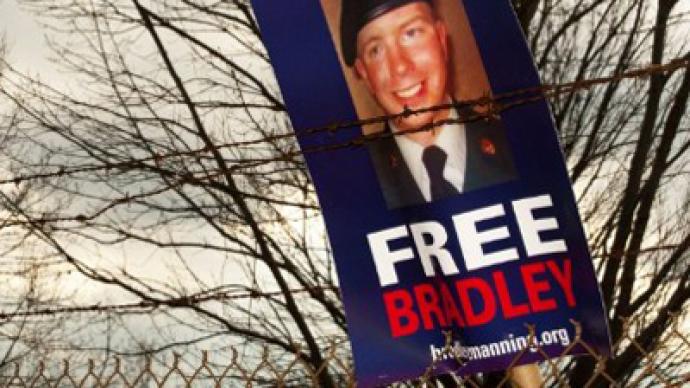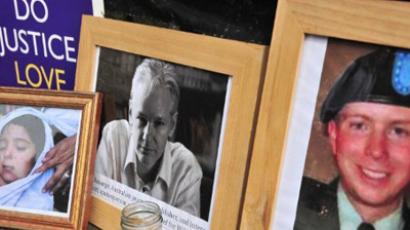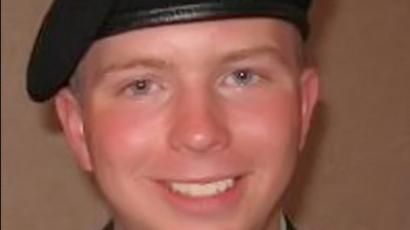Manning's accuser is a convicted drug addict

Opening testimonies in the Article 32 hearing for PFC Bradley Manning raised many questions this week over the credibility of the government’s key witness against the alleged WikiLeaks contributor.
Following four days of testimonies led by the prosecution against Bradley Manning, the attorneys for the accused whistleblower called only two witnesses on behalf of the defense Wednesday before retiring their case. The brief few minutes of testimonies brought by Manning's attorneys follows days of speeches offered by government witnesses, including the former hacker that alerted the authorities who also happens to be a recovering drug addict and felon.With Day Six of the hearing coming to a close in less than two hours Wednesday morning, the court is slated to return Thursday for closing arguments in the Article 32 hearing which will determine if Manning shall go before a court martial. The prosecution called 20 witnesses during the first four days of testimonies before Manning’s attorneys were given only two bodies on the stand.In the days before the case began, David E. Coombs, attorney for Manning, asked the US government for around 50 witnesses to help support his case, including President Barack Obama and Secretary of State Hillary Clinton. Coombs charged on the first day of the hearing that Army Lt. Col. Paul Almanza, the presiding officer, could not possibly be seen as impartial given that he allowed for every witness wanted by the prosecution to take the stand, dwarfing the dismal duo of testimonies that was allowed today. Wednesday morning’s testimonies called by the defense were made up of statements offered by Sergeant Daniel Padgett, one of Manning's superior officers in Baghdad, and Captain Barclay Keay, a night-time supervisor of the soldier. In all, the testimonies lasted 35 minutes, the first five of which were not broadcast to nearby members of the media due to a technical glitch.On Tuesday, the government presented perhaps the most significant witness against Manning, Adrian Lamo, a former hacker. Lamo had forged an online friendship with Manning and says he opened himself up for the soldier to confide in him regarding the leaked documents he is accused of uploading to WikiLeaks, only to later turn him into the authorities. During Tuesday’s testimony, however, Lamo confirmed that he had battled problems with drug abuse and was convicted of a felony. The ex-hacker also attested that he had overdosed on amphetamines, suffered an addition of prescription narcotics in the past and was involuntarily institutionalized at one point.When Coombs questioned Lamo about the chat transcripts between Manning and himself, he specifically called into question Lamo’s insistence to Manning that he was both a minister as well as a journalist. According to the transcripts, Lamo instructed Manning that he could treat their correspondence as either a confession or interview, vowing the truth to “never to be published.”Despite this assurance, Lamo said on the stand this week that Manning “neither declined nor accepted” his offer of source protection. When Coombs asked him why, he told his client of his confession, “none of this is for print,” Lamo told the courtroom, “It was not for print by me.”Lamo also admitted to being diagnosed with Asperger syndrome and was medicated at the time of his chats with Manning. Other testimonies offered up this week linked Manning to documents uploaded to WikiLeaks and allegedly connected the soldier with the site’s mastermind, Julian Assange. As RT reported earlier this week, the introduction of Julian Assange into the case could at last give the US government a reason to extradite the WikiLeaks leaders to America. Authorities in the States have long hunted Assange for his involvement in publishing classified documents to the Web, and by expressing ties between the two men, may finally be able to get him in an American courtroom.Witnesses called by the prosecution linked an online account belonging to Manning with an Internet-account believed to be owned by Assange. In a chat transcript introduced into court, Manning also allegedly tells an online friend, "I was the source of the July 12, 2007, video from the Apache Weapons Team which killed the two journalists and injured two kids.”At the same time, however, Staff Sergeant Peter Bigelow testified on Tuesday that he had no idea who Assange was, calling into question how up-to-snuff the American intelligence community has been throughout the whole ordeal, despite some leaders saying that the Assange/Manning cause could have been a catastrophe for US security and diplomatic relations. Special Agent David Shaver said on Sunday that he had linked Manning’s computer with cables published by WikiLeaks, only to admit during cross-examination the next day that none of those they he compared actually matched.Testimonies this week also largely suggested that Manning was emotionally disturbed during his time in the military and was prone to outbursts and unusual behavior. Former supervisors of the soldier testified that Manning was also expressed symptoms of paranoia and psychosis, struck a female supervisor in the face once and had to be restrained during tantrums in the past. Despite this, he was granted ongoing access to intelligence that the government says was detrimental to the security of the country and jeopardized by Manning’s involvement with Assange. “I'm amazed that the army ever allowed Manning to go to Iraq – let alone anywhere near classified information,” Dominic Rushe of The Guardian writes Tuesday. Daniel Ellsberg, former Department of Defense insider and leaker of the Pentagon Papers, told RT earlier this week that he believes the government is trying to work a confession out of Manning linking him with Assange, regardless of what the truth is. Ellsberg calls into question the 18 months of captivity leading up to the Article 32 hearing, almost a year of which left the soldier in complete and total isolation. “What is torture for?” asked Ellsberg to RT’s Alyona Minkovski on Monday. “It’s really a way of getting false confessions. That’s what it does. That’s what it’s for. And in this case, I think they want not only an association with Assange as with some journalist or whoever, they want this very special, an ‘unjournalistic’ kind of thing. They want to show some kind of conspiracy . . .and they want to break him down.”Ellsberg recalls that his own whistle blowing trial nearly 40 years earlier was dismissed after a judge found “gross governmental misconduct that offends the sense of justice.” In the case of the isolation and torture of Manning, Ellsberg says such a trend is still “perfectly evident” four decades later and he appalled that the hearing is proceeding as it. Following closing arguments slated to begin Thursday, the presiding officer of the court will be tasked with completing his report on the hearing by January 16, 2012, at which point he will have to recommend whether or not Manning shall go before a court martial. Prosecutors have lobbied 22 charges against the alleged whistleblower. If convicted of all, Manning faces the death penalty but the US government says they will not seek capital punishment. The prosecution says Manning penned a text file on a portable memory card in which the soldier wrote of the leaked files, "This is possibly one of the more significant documents of our time, removing the fog of war and revealing the true nature of 21st century asymmetric warfare. Have a good day.”














